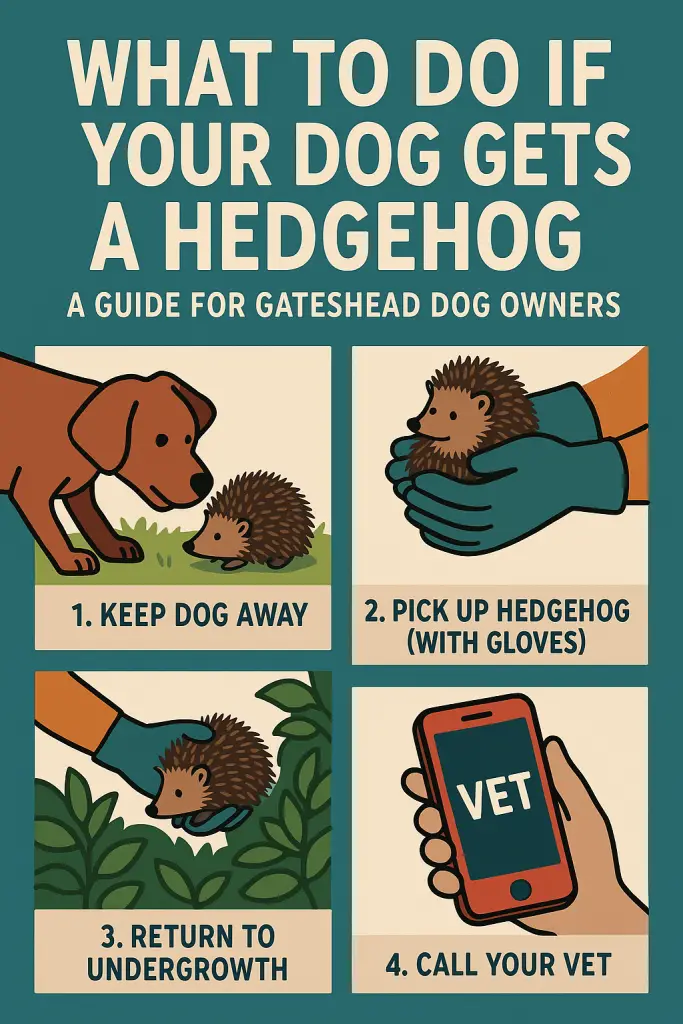
If your dog has ever barked at, pawed at, or even picked up a hedgehog, you’re not alone. These spiky visitors are common in UK gardens and parks, and dogs often get curious — or too close for comfort.
While hedgehogs aren’t aggressive, contact can lead to minor injuries, stress, or infections for both animals. Here’s what to do if your dog gets too involved with a hedgehog, how to prevent problems, and when to seek veterinary help.
🐶 What Happens When Dogs Get Too Close to Hedgehogs?
Most dogs are stung by curiosity. Common scenarios include:
Nosing or biting a hedgehog and getting pricked Pawing or barking at it repeatedly Carrying it in their mouth Occasionally, killing or injuring the hedgehog
🚨 Immediate Steps to Take If Your Dog Gets a Hedgehog
1. Safely Separate Them
If your dog is holding the hedgehog, gently and calmly get them to drop it using a cue or distraction — avoid pulling or shouting.
2. Check for Injuries
Look for:
Bleeding or puncture wounds (especially on the nose, lips, or mouth) Limping, flinching, or paw sensitivity Embedded spines (visible or under the skin)
3. Remove Any Hedgehog Spines
Use clean tweezers to gently pull out visible spines. Wash the area with warm saline (saltwater) if needed.
4. Monitor for Infection or Pain
Watch for:
Swelling, redness, or pus Head shaking or paw licking Loss of appetite or low energy
Contact your vet if any symptoms develop — hedgehog spines can introduce bacteria or cause abscesses if left untreated.
⚠️ Other Risks from Hedgehog Contact
Fleas or mites from the hedgehog Potential exposure to lungworm (rare, but possible from ingestion) Cuts inside the mouth or on paws Stress or trauma for the hedgehog, especially during hibernation season
If your dog has injured a hedgehog, consider contacting your local wildlife rescue centre.
🌿 Prevention Tips for Your Garden or Walks
Don’t leave food out for hedgehogs where your dog roams Supervise garden time during dusk or nighttime, when hedgehogs are active Avoid letting your dog dig near sheds or log piles Keep dogs on lead in areas with thick undergrowth, especially during spring–autumn
🐾 Calm, Safe Care for Curious Dogs
At Chrysidis Pet Care, I understand how curious or excitable dogs can easily get into trouble with wildlife. That’s why I provide:
One-on-one, supervised time outdoors Quiet evening routines to reduce late-night encounters Gentle redirection for reactive or excitable dogs Tailored support for anxious, rescue, or reactive pets
Your dog’s wellbeing — and that of our local wildlife — always comes first.
📣 Final Thought
Most encounters between dogs and hedgehogs result in minor scratches and a lot of barking — but proper aftercare matters. Clean the wound, check for embedded spines, and call your vet if anything looks off.
Looking for calm, crate-free care that puts your dog’s safety first? Chrysidis Pet Care in Gateshead offers one-on-one support for dogs who need more than just a walk in the park.
New to Rover? Get £15 Off Your First Booking!
Book through my affiliate link here and receive £15 off your first service via Rover. It’s the easiest way to try out Chrysidis Pet Care and save!